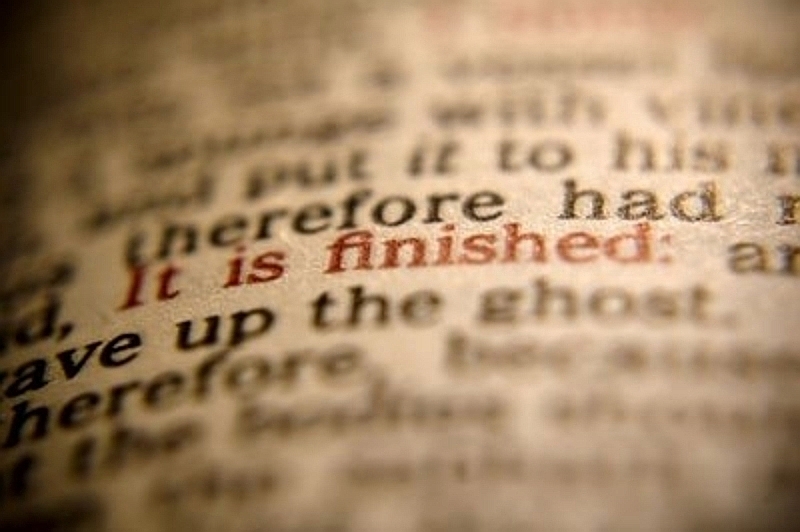Christ: The End of the Law for Justification and Sanctification
In his sermon on John 19:30, the 19th Century Southern Presbyterian theologian, Rev. Thomas Peck, explained how Jesus is the “end of the Law” for both justification and for sanctification when he wrote:
Christ is the end of the law for legal or justifying righteousness (Rom. x. 4, where the term “end” is the noun of the verb in the text). Show how he is so. (Gal. iii. 10-13; Rom. viii. 3, 4.) Show how impossible it is rationally to account for the sufferings of Jesus upon any other supposition than that he was under the curse of the law in our stead.
Second, He is the end or completion of the law for our sanctification. (See 1 Cor. ix. 21: “Under the law to Christ;” 1 Cor. i. 30.) The law is of no use to us in our sanctification except in Jesus. We are sanctified by faith, as well as justified. Jesus is the end of the law for our sanctification, by removing its curse and making way for the access of the Spirit into our hearts. He has made the law of use to us as the rule and measure of our sanctification by giving us through his blood a “good conscience.” (See 1 Tim. i. 5-8.) The folly of seeking holiness by the law without Christ and the Spirit. Both these ends of the law are represented as accomplished by Christ in the blood and water flowing together from his side. (John xix. 34, 35; 1 John v. 6.)1
1. Thomas Peck, Miscellanies (Richmond, VA: Presbyterian Committee of Publication) vol. 3 p. 345




“Are you so foolish? Having begun by the Spirit, are you now being perfected by the flesh?” -Paul the Apostle and Prophet of God in Galatians 3:3. The Christian life begins by the regenerating work of the Holy Spirit and progressive sanctification is the work of the Holy Spirit that Jesus graciously purchased for us. I hope no one shows themself to be a fool by disagreeing with the Apostle.
“He who began a good work in you will bring it to completion.”
Sounds like He does it all.
God is a real God! Not a cosmic helper.
As long as we’re throwing out Scripture…
“Work out your own salvation with fear and trembling, for it is God who works in you, both to will and to work for his good pleasure” (Phil. 2:12-13).
I’m not sure what Mr. Martin meant when he said “He does it all,” but IF he meant that Christians are merely passive in the pursuit of sanctification, that is clearly wrong. See also 1 Tim. 4:10.
Of course all our striving in progressive sanctification is by the strength of the Holy Spirit.
Jed,
You’d better hope that your sanctification doesn’t depend on you.
Thanks be to God that it doesn’t.
What ‘we do’ is the problem…not the solution.
You like Bible? Here’s another one, ‘They asked Jesus what is it to do the works of the Father?’ Jesus answered them, “Believe in the one whom the Father has sent.”
And then there’s Romans 4:4,5
___
You should listen to the class that I currently have posted on my blog.
Whether or not you’ll agree…at least you’ll have a better understanding of why we believe the way we do.
Steve,
Our sanctification does depend on our working out what God is working in. Peter commands us to “Work hard at adding to our faith virtue and to virtue….” We don’t want to fall into a “Let Go and let God” Keswick version of sanctification. It is true that sanctification is by faith in Christ and that we are sanctified in the Sanctified One, Jesus. It is also true that our sanctification is a work of God’s free grace. But unlike justification, we do cooperate with God in the work of sanctification. Now, don’t hear me as saying that the finished work of Christ is incomplete; but, part of the finished work of Jesus at Calvary is the sending of the Holy Spirit to sanctify us and to enable us to put sin to death. The Spirit doesn’t put sin to death in me irrespective of my active participation. Another instance of this would be “self-control.” Note that it is a fruit of the Spirit. God creates fruit in me on basis of the finished work of Jesus for me, and the union that I have with Him by faith. But it is not “Spirit-control.” It is “SELF-control.” Now, we would err if we said that “self-control” was a fruit of the self. That would be legalism. But, the God of heaven has so ordered all things that our Christian lives would be lived out by us in the power of His Spirit through faith in His Son.
Men
Clearly Nick’s explanation is faithful to both the indicative and imperative of Sanctification. If Christ is our “sanctification” the sphere of our labours must be within “Christ” – his finished work of life, death, resurrection and the giving of the Spirit. Thus sanctification remains the work of God in and through man – the means of continual sanctification is Spirit-wrought Christian living.
If only both sides of the divide would see the indicative imperative-essence of sanctification, we wouldn’t have the confusion we have in the church today.
Saying things like “what we do is the problem” is to utterly miss the imperative of sanctification. Without the “what we do”, we have no God-ordained and empowered means in our lives. Doing nothing = an unholy person. Conversely, trying to “do” sanctification without the indicative is powerless and futile and just as damning.
Matt
Matthew,
Then how are you ‘doing’, with respect to your sanctification project?
I much prefer the unselfconscious doing that they were doing when they said to Jesus, “when did we do that?”
They had no idea of doing for sanctification. They were just fulfilling a need.